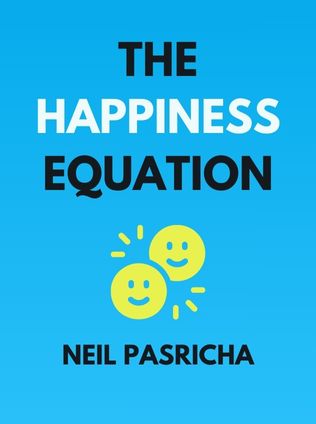
The Happiness Equation
Want Nothing + Do Anything = Have Everything
By Neil Pasricha
Published 03/2015
About the Author
Neil Pasricha, the creative mind behind The Happiness Equation, is a beacon in the realm of self-help and personal development. His journey into exploring happiness began as a personal quest, catalyzed by life challenges and the need for positive reinforcement. Pasricha’s rise to prominence started with his blog, 1000 Awesome Things, which celebrated the simple pleasures of life, from the smell of fresh laundry to finding money in your pocket. This blog garnered millions of followers, eventually leading to his first book, The Book of Awesome, a massive bestseller.
What sets Pasricha apart from other self-help authors is his ability to distill complex psychological concepts into accessible, actionable advice. His work is deeply rooted in positive psychology, yet he presents it with the charm and simplicity that make his ideas easy to implement in everyday life. Pasricha’s writing style is engaging and personable, often laced with humor and warmth, which resonates with readers from all walks of life. His mission is clear: to help people unlock the secrets to happiness and live more fulfilling lives.
Main Idea
The central thesis of The Happiness Equation is that happiness is not a result of achieving success or fulfilling external goals, but rather a choice that can be made and a practice that can be cultivated. Pasricha argues that many of the common beliefs about happiness are misconceptions that actually hinder our ability to be happy. He identifies four key obstacles that prevent us from experiencing true happiness: relying on external circumstances, seeking approval from others, working solely for weekends, and wasting mental energy on trivial tasks. By addressing these obstacles and adopting the practices Pasricha recommends, anyone can learn to cultivate a deep and lasting sense of happiness, independent of external factors.
Table of Contents
- Introduction
- Obstacle #1: Relying on External Circumstances to Make You Happy
- Obstacle #2: Seeking Approval from Others
- Obstacle #3: Working for the Weekend
- Obstacle #4: Wasting Mental Energy
- Conclusion
Obstacle #1: Relying on External Circumstances to Make You Happy
One of the most pervasive myths about happiness is that it depends on our external circumstances—whether it's having the perfect job, the ideal relationship, or achieving certain milestones in life. Pasricha dismantles this myth by explaining that happiness is not about what happens to us, but how we choose to perceive and react to what happens.
He introduces the concept of the "Negativity Bias," an evolutionary trait that predisposes humans to focus on potential threats and problems as a survival mechanism. This bias, while useful in primitive times, now often works against us by causing us to dwell on the negative aspects of our lives rather than appreciating the positive. For instance, if you receive ten compliments and one criticism, the criticism is likely to stick with you more than the compliments. This tendency to focus on the negative can prevent us from feeling happy, even when many aspects of our lives are going well.
To counteract this negativity bias, Pasricha suggests several strategies that can help rewire our brains to focus on the positive:
Sign up for FREE and get access to 1,400+ books summaries.
You May Also Like
The Subtle Art of Not Giving a F*ck
A Counterintuitive Approach to Living a Good Life
By Mark MansonRich Dad Poor Dad
What the Rich Teach Their Kids About Money - That the Poor and Middle Class Do Not!
By Robert T. KiyosakiHow To Win Friends and Influence People
The All-Time Classic Manual Of People Skills
By Dale CarnegieFreakonomics
A Rogue Economist Explores the Hidden Side of Everything
By Steven D. Levitt and Stephen J. Dubner



















